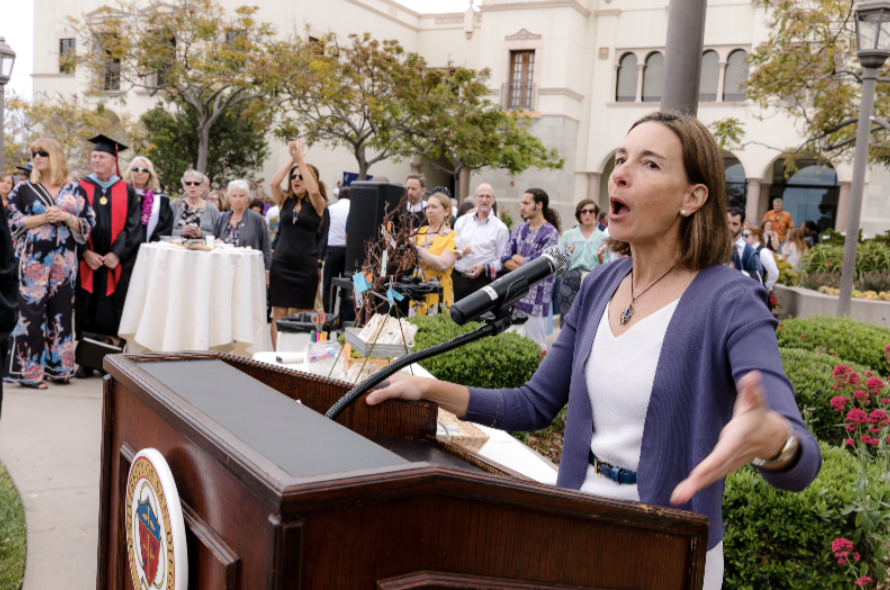The following post was contributed by Patricia Márquez, Dean of the Joan B. Kroc School of Peace Studies.
The month of May marks the end of the academic year at the University of San Diego. It is a time of transition when graduating students shift their focus from coursework to the pursuit of new and exciting professional challenges. With the ongoing pandemic, however, May 2021 represents for all of us the end of a different type of academic year – one that included adjustments, pedagogical innovations and experimentation in learning, as well as in community building.
The Kroc School community of students prevailed to stay connected, learn and gain the skills for the effective practice of changemaking, successfully navigating a context riddled with uncertainties, a spreading virus, lockdowns, and lots of social distancing. There is no doubt in my mind that Kroc School graduates are ever ready to lead positive change. Their resilience and adaptability has been humbling and inspiring. Have no doubt, our students faced a wide-ranging array of tribulations like: “Oh no, my internet is down and my class starts in five minutes…” and “$#@!%$ I can’t get into Zoom…” and “I’ll have to stay awake for the interviews with the Peacemaker at 3 a.m..” Yet, guided by faculty and supported by staff, they persevered to maintain an active engagement in all kinds of school seminars and projects. The challenges they faced were not merely mundane or of a practical order. Several students confronted personal difficulties and misfortunes, including losing loved ones. And once again they continued onwards with their formative path as changemakers, finding strength and support among the Kroc School community of faculty, staff, and peers.
It’s impossible not to admire the ways in which our students saw the upsides in our new reality, pursuing emerging opportunities for greater discovery and community building. They served in institutional committees and working groups and helped shape policy and practice at the school. The new Kroc Diversity, Equity and Inclusion Working Group is an example, which is co-chaired by a MA in Peace and Justice student and a MA in Social Innovation student. They have done these things through positive engagement. Throughout this challenging year, when students gave constructive criticism, it was accompanied by positive reinforcement of the practices that are working well at the school, setting an example in their expressions of gratitude and appreciation for faculty and staff.
Student leadership stood out in building community in the remote and socially distanced context. They were phenomenal at connecting with each other in creative, mission-driven ways, despite constraints. Initiatives organized by the Peace and Justice Student Association (PJSA) included a drive-in movie night, supplemental on-demand mental health programming, and $50 mini-grants for student professional development. On May 8, a group of students focusing on arts creativity, and inclusive community building will host a virtual "socially engaged, participatory dance party.”
Learning social entrepreneurship took a new dimension. Recently, a student came to my office hours to tell me about taking his classes while living in several cities around the world, including Medellín, Colombia, and Washington D.C. Working in different cultural and socio-economic settings allowed him and his team members to refine a social venture proposal to compete in the USD Fowler Global Social Innovation Challenge. They won one of two spots to present at the Global Finals in June, where they will compete with students attending 28 institutions from around the world.
Students graduating in May 2021 came to the Kroc School to embrace a one-of-a-kind learning adventure. They succeeded because of who they are and the vision they have for building a better future. We celebrate their passion and their enthusiasm for what lies ahead. It is a special and important moment at the Kroc School. With still so much suffering and injustice happening, and so much that needs to change, taking a moment to celebrate student achievement fuels our commitment to working together for greater impact. With their eagerness to practice changemaking, our graduates give us hope. We are here to support them now and forever.
Salud!

About the Author
The Joan B. Kroc School of Peace Studies (Kroc School) at the University of San Diego is the global hub for peacebuilding and social innovation. Founded in 2007, the Kroc School equips the next generation of innovative changemakers to shape more peaceful and just societies. We offer master's degrees in peace and justice, social innovation, humanitarian action, conflict management and resolution, and a dual degree in peace and law — programs that have attracted diverse and dynamic students from more than 50 countries. In addition to our graduate programs, the Kroc School is home to the Kroc Institute for Peace and Justice (Kroc IPJ). Founded in 2001, the Institute supports positive change beyond the classroom. Through groundbreaking research, experiential learning, and forward-thinking programs, the Kroc School and Kroc IPJ are shaping a future in which peaceful co-existence is the new normal.






